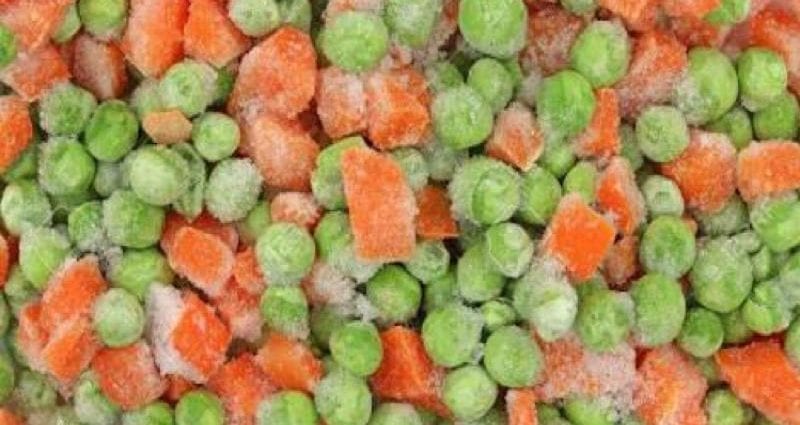Nutritional value and chemical composition.
The table shows the content of nutrients (calories, proteins, fats, carbohydrates, vitamins and minerals) per 100 grams edible part.
| Nutrient | Quantity | Norm** | % of the norm in 100 g | % of the norm in 100 kcal | 100% normal |
| Calorie value | 38 kCal | 1684 kCal | 2.3% | 6.1% | 4432 g |
| Proteins | 2.17 g | 76 g | 2.9% | 7.6% | 3502 g |
| Fats | 0.27 g | 56 g | 0.5% | 1.3% | 20741 g |
| Carbohydrates | 6.48 g | 219 g | 3% | 7.9% | 3380 g |
| Alimentary fiber | 2 g | 20 g | 10% | 26.3% | 1000 g |
| Water | 88.15 g | 2273 g | 3.9% | 10.3% | 2579 g |
| Ash | 0.93 g | ~ | |||
| Vitamins | |||||
| Vitamin A, RE | 289 μg | 900 μg | 32.1% | 84.5% | 311 g |
| Vitamin B1, thiamine | 0.074 mg | 1.5 mg | 4.9% | 12.9% | 2027 g |
| Vitamin B2, riboflavin | 0.053 mg | 1.8 mg | 2.9% | 7.6% | 3396 g |
| Vitamin B5, pantothenic | 0.12 mg | 5 mg | 2.4% | 6.3% | 4167 g |
| Vitamin B6, pyridoxine | 0.088 mg | 2 mg | 4.4% | 11.6% | 2273 g |
| Vitamin B9, folate | 18 μg | 400 μg | 4.5% | 11.8% | 2222 g |
| Vitamin C, ascorbic | 6.6 mg | 90 mg | 7.3% | 19.2% | 1364 g |
| Vitamin PP, NE | 0.581 mg | 20 mg | 2.9% | 7.6% | 3442 g |
| Macronutrients | |||||
| Potassium, K | 100 mg | 2500 mg | 4% | 10.5% | 2500 g |
| Calcium, Ca | 23 mg | 1000 mg | 2.3% | 6.1% | 4348 g |
| Magnesium, Mg | 14 mg | 400 mg | 3.5% | 9.2% | 2857 g |
| Sodium, Na | 260 mg | 1300 mg | 20% | 52.6% | 500 g |
| Sulfur, S | 21.7 mg | 1000 mg | 2.2% | 5.8% | 4608 g |
| Phosphorus, P | 46 mg | 800 mg | 5.8% | 15.3% | 1739 g |
| Trace Elements | |||||
| Iron, Fe | 0.75 mg | 18 mg | 4.2% | 11.1% | 2400 g |
| Manganese, Mn | 0.357 mg | 2 mg | 17.9% | 47.1% | 560 g |
| Copper, Cu | 103 μg | 1000 μg | 10.3% | 27.1% | 971 g |
| Selenium, Se | 0.9 μg | 55 μg | 1.6% | 4.2% | 6111 g |
| Zinc, Zn | 0.58 mg | 12 mg | 4.8% | 12.6% | 2069 g |
| Essential Amino Acids | |||||
| Arginine * | 0.164 g | ~ | |||
| valine | 0.094 g | ~ | |||
| Histidine * | 0.042 g | ~ | |||
| Isoleucine | 0.079 g | ~ | |||
| leucine | 0.125 g | ~ | |||
| lysine | 0.123 g | ~ | |||
| methionine | 0.031 g | ~ | |||
| threonine | 0.081 g | ~ | |||
| tryptophan | 0.016 g | ~ | |||
| phenylalanine | 0.079 g | ~ | |||
| Replaceable amino acids | |||||
| alanine | 0.098 g | ~ | |||
| Aspartic acid | 0.206 g | ~ | |||
| glycine | 0.072 g | ~ | |||
| Glutamic acid | 0.307 g | ~ | |||
| Proline | 0.069 g | ~ | |||
| serine | 0.072 g | ~ | |||
| tyrosine | 0.045 g | ~ | |||
| Cysteine | 0.013 g | ~ | |||
| Saturated fatty acids | |||||
| Saturated fatty acids | 0.049 g | max 18.7 г | |||
| 16: 0 Palmitic | 0.043 g | ~ | |||
| 18: 0 Stearin | 0.004 g | ~ | |||
| Monounsaturated fatty acids | 0.023 g | min 16.8 г | 0.1% | 0.3% | |
| 18: 1 Olein (omega-9) | 0.022 g | ~ | |||
| Polyunsaturated fatty acids | 0.129 g | from 11.2 to 20.6 | 1.2% | 3.2% | |
| 18: 2 Linoleic | 0.105 g | ~ | |||
| 18: 3 Linolenic | 0.023 g | ~ | |||
| Omega-3 fatty acids | 0.023 g | from 0.9 to 3.7 | 2.6% | 6.8% | |
| Omega-6 fatty acids | 0.105 g | from 4.7 to 16.8 | 2.2% | 5.8% |
The energy value is 38 kcal.
- cup = 255 g (96.9 kCal)
Peas and carrots, canned, standard packing rich in vitamins and minerals such as: vitamin A – 32,1%, manganese – 17,9%
- Vitamin A is responsible for normal development, reproductive function, skin and eye health, and maintaining immunity.
- Manganese participates in the formation of bone and connective tissue, is part of the enzymes involved in the metabolism of amino acids, carbohydrates, catecholamines; essential for the synthesis of cholesterol and nucleotides. Insufficient consumption is accompanied by a slowdown in growth, disorders in the reproductive system, increased fragility of bone tissue, disorders of carbohydrate and lipid metabolism.
Tags: calorie content 38 kcal, chemical composition, nutritional value, vitamins, minerals, what are the benefits of Peas and carrots, canned, standard packaging, calories, nutrients, useful properties Peas and carrots, canned, standard packaging










